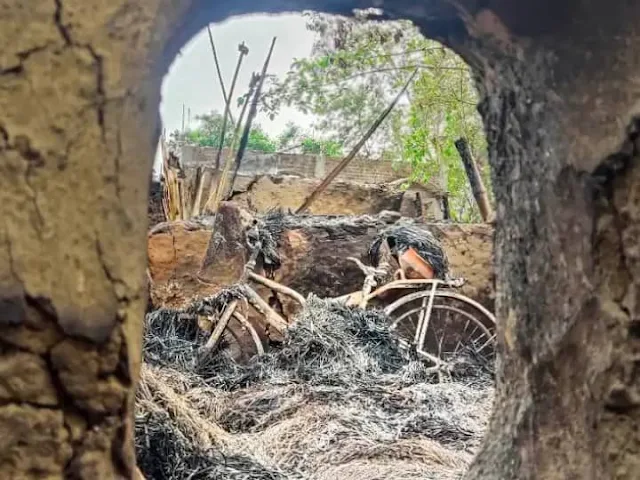By Kirity Roy*
The prime accused of the Bogtui massacre in Birbhum died in CBI custody on December 12. His body was found hanging in the CBI camp washroom at Rampurhat. This sudden incident in the Bogtui case hints towards a possible conspiracy on the part of the investigating authority.
Lalon Sheikh was one of prime accused and a witness in the horrendous massacre at Bogtui village, near Rampurhat of Birbhum district in West Bengal, which took place on March 21, 2022. To suppress all the kingpins of the racket of trafficking and money laundering cases, where many leaders of political parties, law enforcing agencies are involved, the victim's voice was throttled, I apprehend. This is not the first of its kind incident. The cases of "suicides" in custody have happened several times in the past.
The prime accused of the Bogtui massacre in Birbhum died in CBI custody on December 12. His body was found hanging in the CBI camp washroom at Rampurhat. This sudden incident in the Bogtui case hints towards a possible conspiracy on the part of the investigating authority.
Lalon Sheikh was one of prime accused and a witness in the horrendous massacre at Bogtui village, near Rampurhat of Birbhum district in West Bengal, which took place on March 21, 2022. To suppress all the kingpins of the racket of trafficking and money laundering cases, where many leaders of political parties, law enforcing agencies are involved, the victim's voice was throttled, I apprehend. This is not the first of its kind incident. The cases of "suicides" in custody have happened several times in the past.
The death of Lalon in custody not only points toward possible violation, it will also weaken the case against many high-profile accused in the case. These cases of suicides particularly in the high-profile criminal cases raises a number of questions and demands on the criminal justice system in India:
1. The section 176(1) of CrPC specifies the procedure in case of custodial deaths. The police of West Bengal have seemed to be ignoring the section as a whole. But the current case was in the hands of the CBI. We demand that the CBI and the local administration must adhere to the legal provisions in the cases of custodial deaths.
2. Though the incident occurred in the custody of CBI, it was the Kolkata High Court, which passed the case to CBI in an exceptional way. Thus, in case of any violation the Court too should be held liable, and necessary steps must be taken. Unnatural death in judicial custody should be investigated thoroughly and independently.
3. In India, the implementation of the Minnesota Protocol and Istanbul Protocol is scarce. Necessary steps should be taken for the implementation of the same during the Post-mortem examination of the bodies in case of custodial deaths.
1. The section 176(1) of CrPC specifies the procedure in case of custodial deaths. The police of West Bengal have seemed to be ignoring the section as a whole. But the current case was in the hands of the CBI. We demand that the CBI and the local administration must adhere to the legal provisions in the cases of custodial deaths.
2. Though the incident occurred in the custody of CBI, it was the Kolkata High Court, which passed the case to CBI in an exceptional way. Thus, in case of any violation the Court too should be held liable, and necessary steps must be taken. Unnatural death in judicial custody should be investigated thoroughly and independently.
3. In India, the implementation of the Minnesota Protocol and Istanbul Protocol is scarce. Necessary steps should be taken for the implementation of the same during the Post-mortem examination of the bodies in case of custodial deaths.
4. Investigating authority should abide by the specific guidelines of NHRC in the cases of custodial deaths and the judicial bodies should pressurize the investigating authorities to do so.
This kind of incident points towards a serious lapse in the policing system in India. Initiative should be taken for police reforms to be undertaken in accordance with the judgment of Prakash Singh case.
These are the questions which are in immediate need to be answered. We urge the concerned authorities to take necessary actions to stop further such incidents, and we demand an independent judicial enquiry in the case of Lalon Sheikh's custodial death to bring out the truth to light.
---
*Secretary, Banglar Manabadhikar Suraksha Mancha (MASUM); National Convenor, Programme Against Custodial Torture & Impunity (PACTI), Hooghly
This kind of incident points towards a serious lapse in the policing system in India. Initiative should be taken for police reforms to be undertaken in accordance with the judgment of Prakash Singh case.
These are the questions which are in immediate need to be answered. We urge the concerned authorities to take necessary actions to stop further such incidents, and we demand an independent judicial enquiry in the case of Lalon Sheikh's custodial death to bring out the truth to light.
---
*Secretary, Banglar Manabadhikar Suraksha Mancha (MASUM); National Convenor, Programme Against Custodial Torture & Impunity (PACTI), Hooghly


.jpg)
Comments